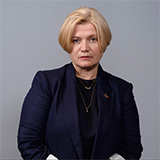Президент Віктор Янукович: мстива, злодійкувата і віддана законам кримінального світу (Economist)
Арешт Юлії Тимошенко, колишнього Прем'єр-міністра України, 5 серпня не став сюрпризом, однак усе ж містив елемент несподіванки. Він був очікуваним не через те, що Юлія Тимошенко зробила чи не зробила на посаді глави уряду, а тому що ми знаємо, що за людина Президент Віктор Янукович: мстива, злодійкувата і віддана законам кримінального світу.
Ukrainian justice
Don't cross Viktor
Yulia Tymoshenko's arrest seems motivated by a desire for revenge
Aug 13th 2011 | MOSCOW | Economist from the print edition
Safeguarding your right to peaceful protest
THE arrest of Yulia Tymoshenko, a former prime minister of Ukraine, on August 5th was predictable, but it still came as a nasty surprise. It was predictable not because of anything she had or had not done but because of the kind of man that Viktor Yanukovich, the president of Ukraine, is: thuggish, vengeful and guided by the codes of the underworld. It was a surprise because Mr Yanukovich is a pragmatic man, and the arrest of his biggest political rival seems likely to do him more harm than good.
The regime's persecution of Ms Tymoshenko began almost immediately after she (narrowly) lost last year's presidential election. First, Mr Yanukovich hired foreign investigators and prosecution lawyers to dig up dirt on her. But they found little. So instead, in May prosecutors charged Ms Tymoshenko with exceeding her authority in signing a gas agreement with Russia in 2009.
This had the unusual effect of angering both Russia and the European Union. Russia saw the charges as an indirect attack on Vladimir Putin, its prime minister, who had signed the agreement with Ms Tymoshenko. The EU was unhappy because it had benefited from the deal, which had ended a stand-off that had left parts of the continent freezing.
The formal reason for Ms Tymoshenko's arrest last week was "contempt of court". In fact, most observers say, it was her contempt for Mr Yanukovich and his men that put her behind bars. Ms Tymoshenko used her trial to turn prosecution witnesses into laughing-stocks. When Nikolai Azarov, Ukraine's current prime minister, refused to accede to her demand that he speak Ukrainian rather than Russian, she asked for an interpreter. She questioned senior officials about their families' business interests and about their involvement in RosUkrEnergo, a gas intermediary.
If found guilty, as seems likely, Ms Tymoshenko faces up to ten years in prison. She may be released under an amnesty, or have her sentence reduced. But a conviction would preclude her from running against Mr Yanukovich again, in a campaign in which she would no doubt ridicule his criminal past and frequent gaffes.
Yet by settling scores, Mr Yanukovich may also have damaged his own cause. Opinion polls suggest that Ms Tymoshenko, who is no angel and mistrusted by many Ukrainians, posed no real threat to Mr Yanukovich. Yet they also show that Mr Yanukovich could lose an election against another opponent, such as Arseny Yatsenyuk, a former central banker and parliamentary speaker. As Yulia Mostovaya, the editor of Zerkalo Nedeli, a weekly, explains, by putting Ms Tymoshenko in jail, Mr Yanukovich has both lost a useful sparring partner and united a fractious opposition.
The images of Ms Tymoshenko being led away from the courtroom, and of heavy-clad paramilitaries dispersing small protests outside, have confirmed many people's worst fears about Mr Yanukovich. By locking up Ms Tymoshenko before her trial was over, he has crossed a line. In this he is reminiscent of Vladimir Putin during his first term as Russia's president, when he chose to have Mikhail Khodorkovsky, an oil tycoon, arrested in 2003.
The difference is that Mr Putin knew what he was doing. Mr Yanukovich, by contrast, seems to have waded across the Rubicon without noticing. Still, in Ukraine as in Russia, the problem with such acts of retribution is that they make the peaceful transfer of power from one leader to another that much less likely.







